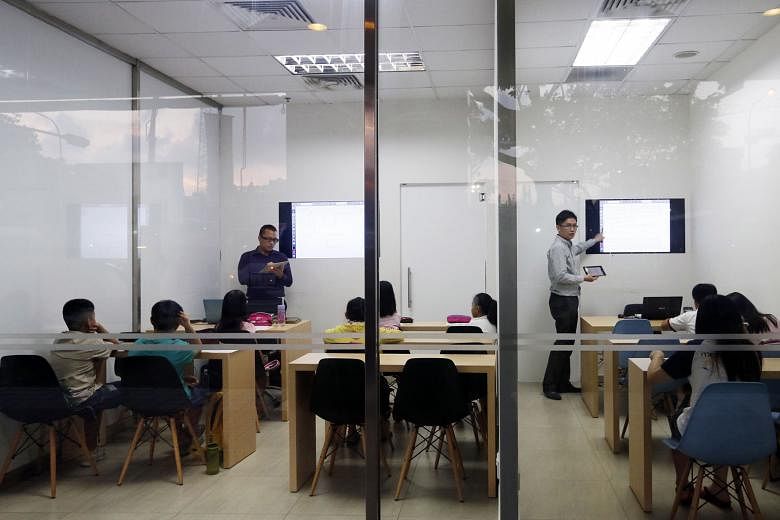The majority of parents here are spending hundreds of dollars every month on private tuition, despite knowing that extra classes may not significantly help raise their children's grades.
And even before the children attend formal school, many children under seven are spending hours in extra classes every week brushing up on their English and maths.
These findings came out in a large-scale survey which looked at the growing tuition industry here.
The survey of 500 parents, conducted by The Straits Times and research company Nexus Link, found that seven in 10 enrolled their children in extra classes.
Nearly eight in 10 parents with children in primary school pay for private tuition, while more than six out of 10 parents with secondary school children do so.
The paper chase begins early. Nearly 40 per cent of parents with children in pre-schools have tuition for them. When asked why, the top two reasons given were to improve their children's grades and to help them keep up with others.
Among those with children in primary school, almost 70 per cent said it was to improve grades, but 52 per cent said it was to help their children keep up with others.
But only a third of all parents agreed the extra tuition actually pulled up academic performance by "a noticeable extent".
Nexus Link chief methodologist Jack Loo said the survey clearly showed that parents sent their children for tuition not because they believed grades will rise but because of peer pressure and competition.
"Parents perceive tuition as a form of safety net and something that is necessary because everyone else is doing it," he said.
Experts such as Nanyang Technological University economist Eus- ton Quah noted that the high prevalence of tuition does not indicate a lack of confidence in the education system. "It could simply be the consequence of an increased climate of competition," he said.
The median amount a month spent on tuition for pre-school was $155, for primary school, $205, and for secondary school, $260.
School examinations such as the O levels and PSLE could also be adding to the pressure for parents to ensure their children do well in them.
That pushes parents to pay for expensive private tuition, said Associate Professor Jason Tan from the National Institute of Education.
He said: "In Singapore, parents see the PSLE as a high-stakes exam, as it will decide the secondary schools and academic streams that their children will enter."
Prof Quah, who published a study in 2005 on tuition with co-researcher Roland Cheo, suggested tuition could actually be working against students.
"Excessive studying could be counterproductive in the same way that doing too much in any one activity, including leisure and recreation, often brings about a decline in the enjoyment of those activities," he said.
The survey showed that, on average, pre-school children went for two hours of tuition a week, while primary and secondary school students spent three hours a week on tuition after school.
Some parents, such as businesswoman Clara Tan, 38, swear by the importance of tuition.
"After two years, my daughter's grade in maths went from B to A and she is less fearful of the subject. So, for me, it is worth the $400 I pay every month."


